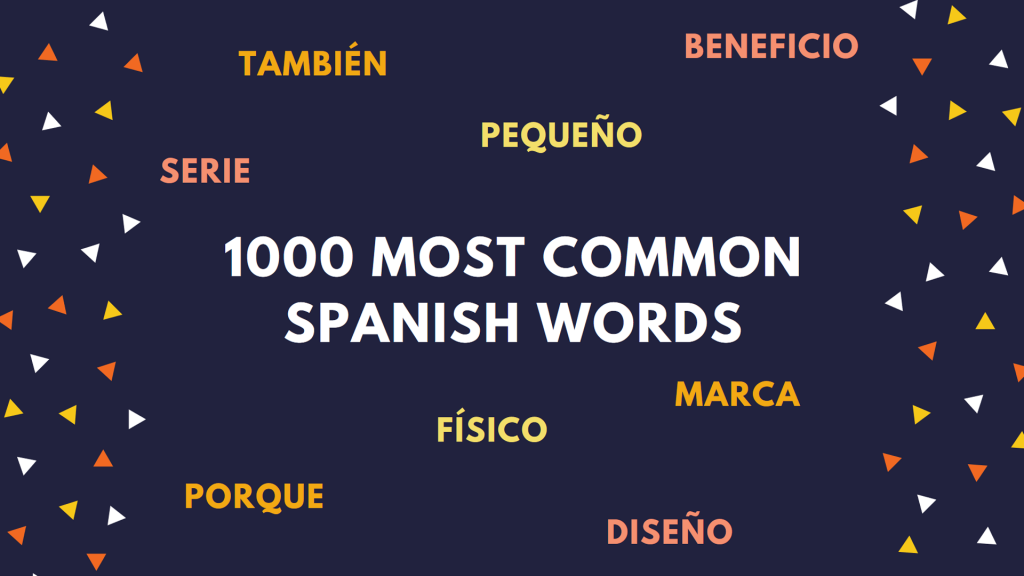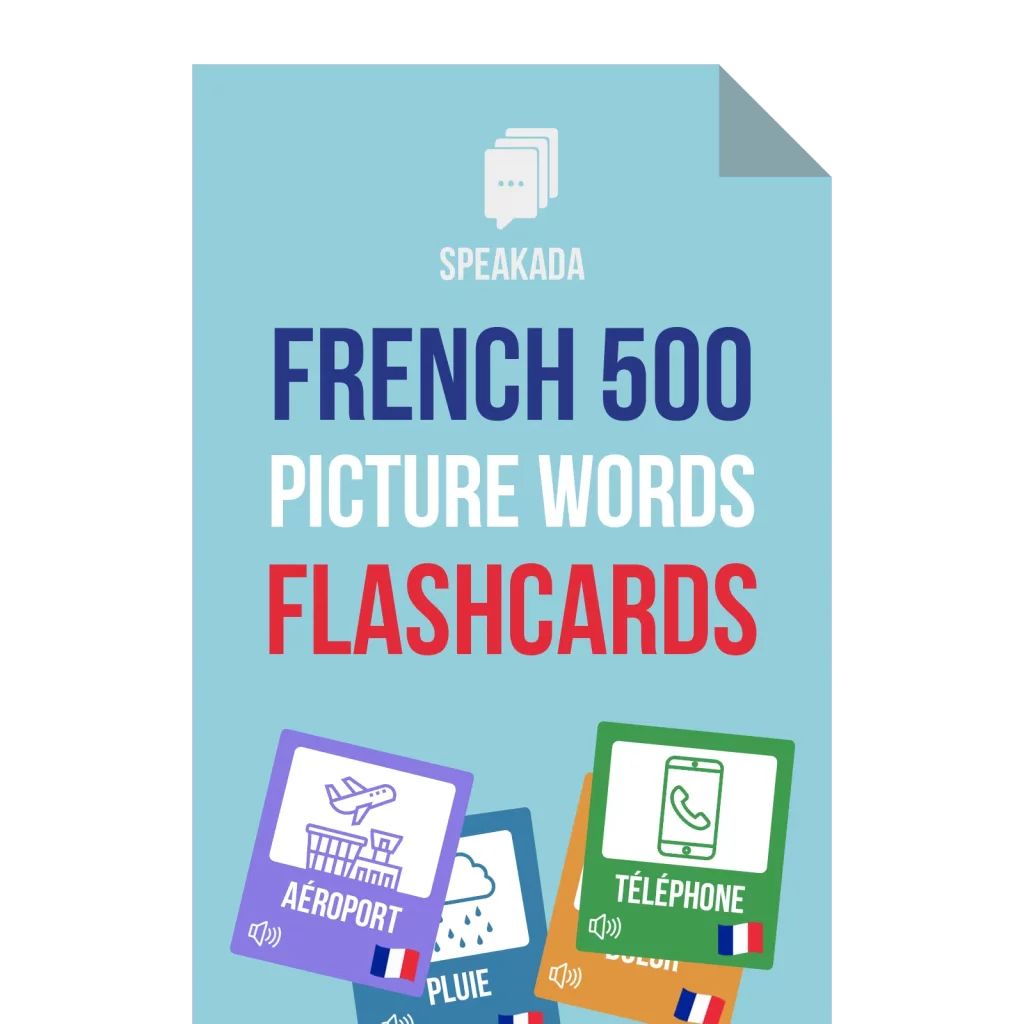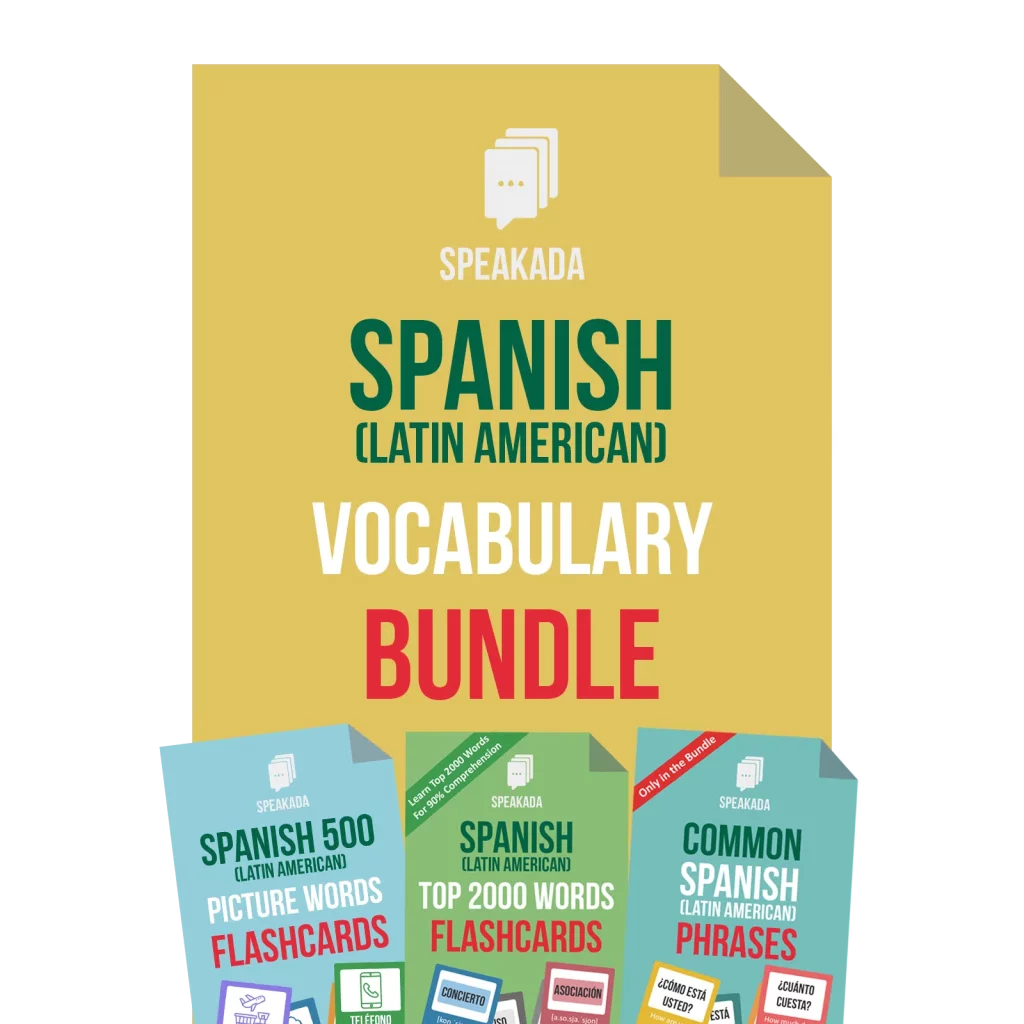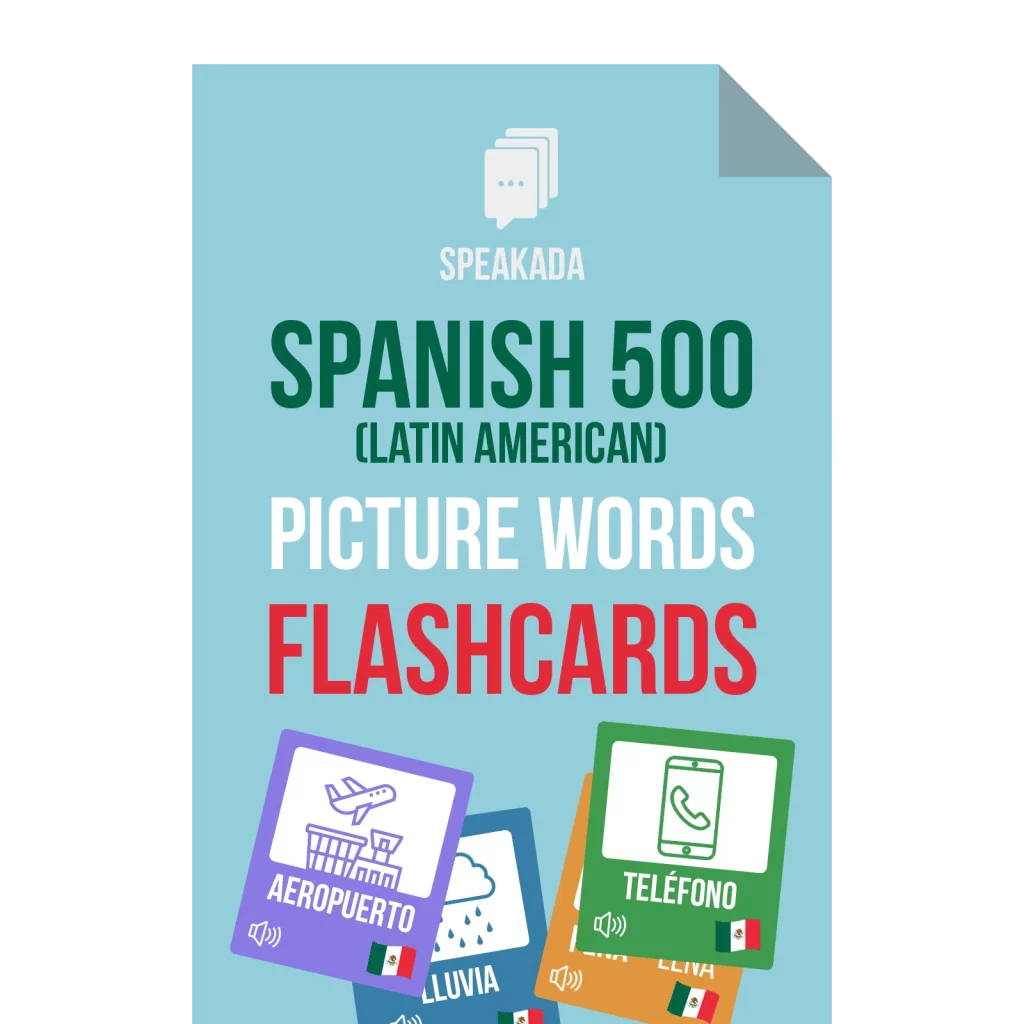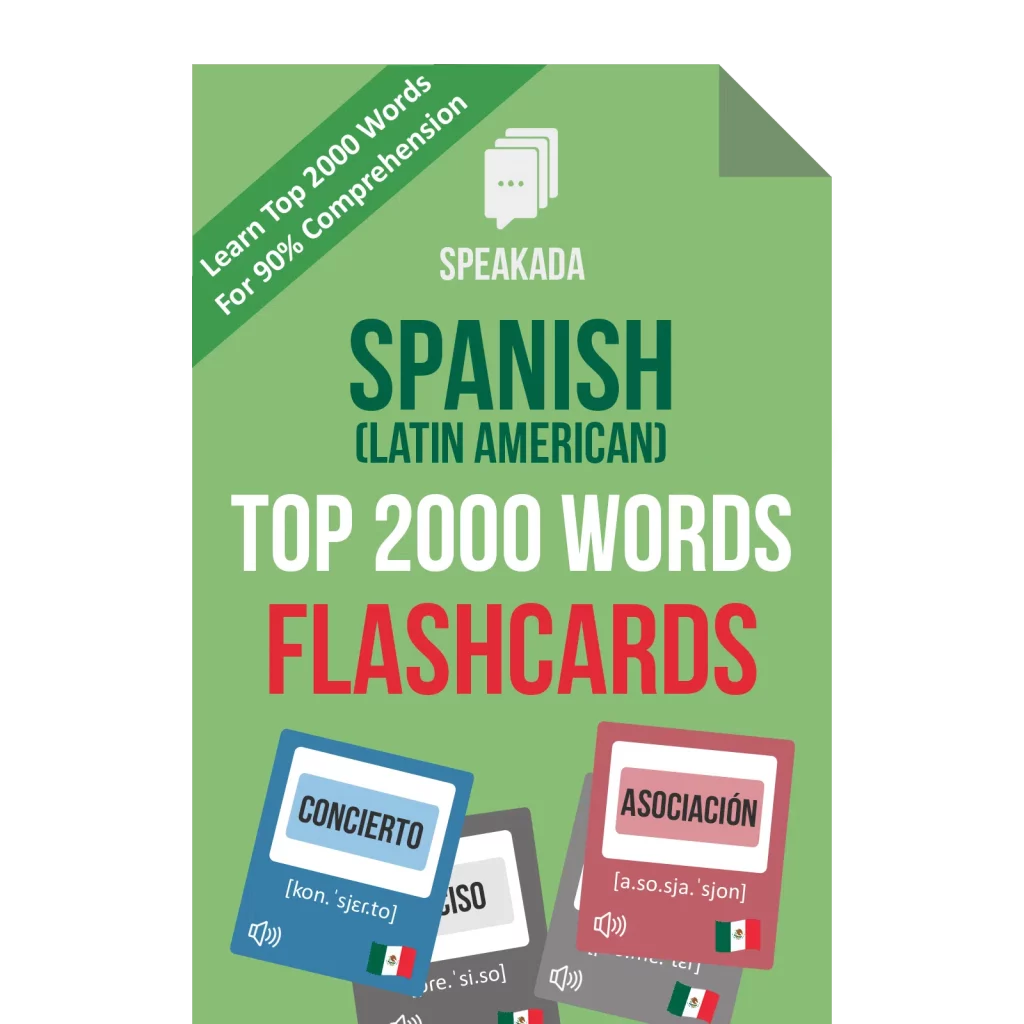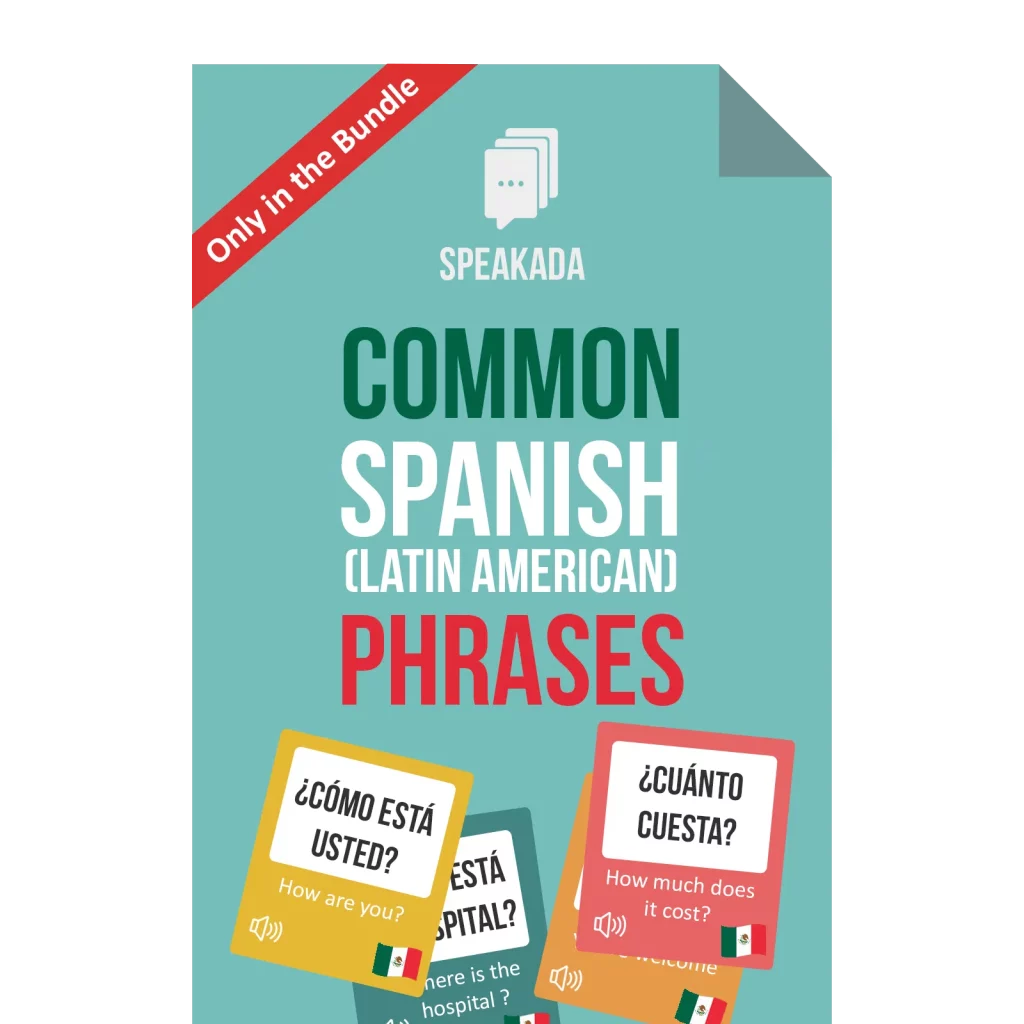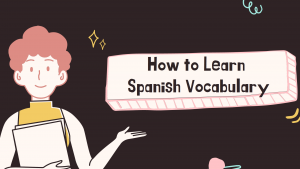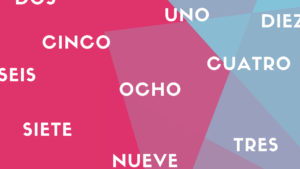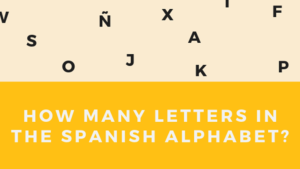1000 Most Common Spanish Words List and How to Use It
The 1000 most common Spanish words are the top 1000 Spanish words that are most frequently used in the Spanish language. If you are learning Spanish, you’ll want to know the top 2000 words as it will give you 90% of Spanish comprehension, according to research. Nevertheless, you can start with the top 1000 Spanish words first, because you’ll get about 80% comprehension of Spanish speech and texts. You’ll also get momentum because you’ll be able to learn half of the top 2000.
For the purposes of this article, we’ll go through specifically why the 1000 most common Spanish words are important to learn, how they are determined, how to get your free copy of the 1000 Spanish word list and how to use them effectively.
Why are the 1000 most common Spanish words important to learn?
In the Spanish language, there are hundreds of thousands of words that you could potentially learn. So how do you know where to start, especially if you’re a beginner and you don’t know which vocabulary you should learn?
80% of words used in Spanish are from the top 1000 Spanish words
In Spanish, there are only a few thousand words that make up the bulk of daily words that we see in daily speech, texts, TV programs, books, songs and other popular Spanish-language media.
Paul Nation, a renowned academic and linguist from the University of Wellington, in New Zealand has demonstrated and researched this. According to Paul Nation’s research, learning the top thousand Spanish words will give you about 80% coverage in Spanish texts, including Spanish conversations in daily life. This means that if you learn the top thousand words of Spanish, then you’ll be able to read a book or listen to a conversation and you’ll be able to understand about 80% of the words that are used.
Therefore, by learning the 1000 most common Spanish words, you are learning the most valued words in the Spanish language and therefore it will help you get to fluency faster.
Maximize and leverage your learning
In the United States, Mark Davies, the academic who specializes in Spanish vocabulary, published the Frequency Dictionary of Spanish. He examined the coverage of these words as it applied to many various texts and he found that learning the top thousand words will allow you to maximize and leverage your learning. If you know the 1000 most frequently used Spanish vocab, then you’ll be able to understand a large percentage of Spanish texts and Spanish media, including Spanish speech.
There is a valuable lesson in this research. Spanish learners need to pay more attention to the top 1000 most common Spanish words and they need to know them well, especially at the beginner and intermediate stages. Instead of learning words that are less frequently spoken and used, Mark Davies’ research shows that it is far more effective to learn the most common Spanish words. It’s one of the first stepping stones in learning the large number of possible words in the Spanish vocabulary.
How is the Spanish frequent word list determined?
Now that we understand the usefulness of the 1000 most common Spanish words, how is the Spanish frequency word list determined?
1. The idea of Lemmas
Let’s examine first the concept of a “word” because that’s the initial building block of what constitutes a frequency word list. It’s important to understand what a “word” is because although we use words in our daily lives, when we try and define what a word is for the purposes of this list, it can get confusing.
Generally, academics and linguists suggest that the counting of a word in a frequency list should be determined by looking at word families, or lemmas as they’re called. You can consider lemmas as the “root word” of a given word family. A simple way to think about lemmas is for you to think about the word entries in a standard dictionary. All of the words in a dictionary are categorized by lemmas and word families. Good frequency lists also categorize words in this way.
Word families account for and group all of the variations, conjugations, and inflections of a root word. For example, let’s examine the lemma or root word “comer”. We don’t separate words “comer” (to eat), “como” (I eat), “comes” (you eat) and “comen” (they eat) as separate words in the frequency list. Rather, what we do is we combine all those words together and consider them as a word family. We simply use the lemma or root word, which is “comer” and consider “comer” and all of its variants as one word.
Therefore, every time “comer” and all of its variants show up in different speeches and text like in popular Spanish media, they’re all counted and contribute to the frequency of the word and lemma “comer”.
However, you should be aware that there are some frequency lists or word lists on the internet that separate out each of the individual words. They don’t group words as word families and lemmas. Although this is not the way linguists and academic researchers would suggest to organize frequency word lists. It can be quite confusing, because the scientific research almost always refers to lemmas and word families. When linguists say that you should be learning the top 1000 or 2000 words in Spanish, in order to get 80 to 90% of text coverage, they often refer to lemmas and word families. So I strongly recommend that you use and study from word lists that are based on Spanish lemmas and word families as words.
2. Frequency and source of a word
Another consideration is the frequency and the source material of a frequency list. Where you get your frequency list from and the sources in which they get their words are very important to know. This is because these factors can significantly alter the types of words that show up in the Spanish frequency word list you use.
For example, Mark Davies’ research in Spanish vocabulary and frequency used a range of texts from books, newspapers, speeches, scripts, radio, movies, television programs, a whole range of texts from both Spain and Latin America and largely from historical materials from the past.
This is a good starting point, however over time the use of different words can change. In the word list and 2000 words Spanish flashcards that we provide, we like to take into account not only Mark Davies’ research but also using a technology and process that we’ve developed to collect and analyze the text, videos, audios found in today’s Spanish speaking webpages all across the internet. This means we analyze billions and millions of web pages in order to determine our list, which is more modern, and contains more vocabulary that is more useful.
In addition, through our own research, we’ve had the opportunity also to separate our list from Latin American Spanish vocabulary to Spanish vocabulary from Spain. We’ve been able to do that because we’re able to find websites or materials that only originated from those different regions and therefore are able to have vocabulary more relevant to learners of those varieties of Spanish. This can be useful for you if you’re focusing your learning on a particular regional variety of Spanish.
What are the 1000 most common Spanish words?
Since there are too many words to cover in the top 1000 Spanish words, we’ve conveniently compiled them below in alphabetical order. The 1000 words are grouped into lemmas. They’re based on a combination of our modern research and academic studies. Plus, they’re categorized between the top 1000 Spanish words for Latin America and for Spain.
| a | de | institución | presentación |
| a través de | debate | institucional | presentar |
| abril | deber | instituto | presente |
| abrir | década | instrumento | presidente |
| académico | decidir | integral | presupuesto |
| acceso | decir | integrar | pretender |
| acción | decisión | intentar | prever |
| aceptar | declaración | interés | previo |
| acercar | declarar | interesar | primero |
| acompañar | decreto | interior | principal |
| actividad | dedicar | internacional | principio |
| acto | defensa | internet | privar |
| actor | definir | interno | problema |
| actual | dejar | intervención | procedimiento |
| actualmente | delito | inversión | proceso |
| actuar | demanda | investigación | producción |
| acuerdo | demostrar | invitar | producir |
| adecuar | denominar | ir | producto |
| adelante | dentro | jefe | productor |
| además | departamento | jornada | profesional |
| administración | depender | joven | profesor |
| administrativo | deportivo | judicial | programa |
| adquirir | derecho | juego | promedio |
| advertir | desarrollar | juez | promover |
| afectar | desarrollo | jugador | propiedad |
| afirmar | desde | jugar | propio |
| agente | desear | juicio | proponer |
| agosto | después | julio | propuesta |
| agregar | destacar | junio | protección |
| agua | destinar | junto | proteger |
| ahí | detalle | jurídico | provincia |
| ahora | detener | justicia | provincial |
| aire | determinar | labor | provocar |
| alcanzar | día | laboral | próximo |
| algo | diario | lado | proyecto |
| alguien | diciembre | largo | prueba |
| alguno | diferencia | le | publicar |
| alimento | diferente | leer | público |
| allá | difícil | legal | pueblo |
| allí | digital | ley | puerta |
| alrededor | dinero | libertad | puerto |
| alto | dios | libre | pues |
| alumno | diputado | libro | puesto |
| ambiental | dirección | líder | punto |
| ambiente | directo | limitar | que |
| ámbito | director | línea | qué |
| ambos | dirigente | lista | quedar |
| América | dirigir | llamar | querer |
| amigo | diseño | llegar | quien |
| amor | disfrutar | llevar | quién |
| amplio | disponer | llevar a cabo | razón |
| análisis | disponible | lo | real |
| analizar | disposición | local | realidad |
| año | distinto | lograr | realizar |
| ante | distrito | lucha | recibir |
| anterior | diverso | luego | reconocer |
| antes | docente | lugar | reconocimiento |
| anunciar | documento | lunes | recordar |
| aparecer | dólar | luz | recuperar |
| aplicación | domingo | madre | recurso |
| aplicar | don | maestro | red |
| aportar | donde | malo | reducir |
| apoyar | duda | mañana | referencia |
| apoyo | durante | manejo | referir |
| aprender | economía | manera | reforma |
| aprobar | económico | manifestar | régimen |
| aprovechar | edad | mano | región |
| aquel | edición | mantener | regional |
| aquí | edificio | mar | registrar |
| área | educación | marca | registro |
| Argentina | educativo | marcar | relación |
| argentino | efecto | marco | relacionar |
| armar | efectuar | marzo | representante |
| arte | ejemplo | mas | representar |
| artículo | ejercicio | más | república |
| artista | el | materia | requerir |
| asegurar | él | material | requisito |
| así | elaborar | máximo | resolución |
| asimismo | elección | mayo | resolver |
| asistir | electoral | mayor | respectivo |
| asociación | eléctrico | mayoría | respecto |
| asociar | electrónico | me | responder |
| aspecto | elegir | mediante | responsabilidad |
| asumir | elemento | médico | responsable |
| asunto | ello | medida | respuesta |
| atención | ellos | medio | resto |
| atender | emitir | mejor | resultado |
| aumentar | empezar | mejorar | resultar |
| aumento | empleo | mencionar | reunión |
| aun | empresa | menor | reunir |
| aunque | en | menos | revista |
| auto | encontrar | mensaje | riesgo |
| autor | encuentro | mercado | río |
| autoridad | energía | mes | rojo |
| avanzar | enero | mesa | rural |
| ayer | enfermedad | método | ruta |
| ayuda | enfrentar | metro | sábado |
| ayudar | entender | mexicano | saber |
| bajar | entidad | México | sacar |
| bajo | entonces | mi | sala |
| banco | entrada | miembro | salida |
| banda | entrar | mientras | salir |
| barrio | entre | militar | salud |
| basar | entrega | mínimo | san |
| base | entregar | ministerio | Santiago de Chile |
| básico | enviar | ministro | santo |
| beneficio | época | minuto | se |
| bien | equipo | mirar | secretario |
| blanco | error | mismo | sector |
| brindar | escenario | modelo | sede |
| bueno | escribir | modificar | seguir |
| Buenos Aires | escuchar | modo | según |
| buscar | escuela | momento | segundo |
| cabeza | ese | morir | seguridad |
| cada | esfuerzo | mostrar | seguro |
| caer | espacio | motivo | selección |
| calidad | España | motor | semana |
| calle | español | movimiento | señalar |
| cámara | especial | mucho | señor |
| cambiar | especialmente | muerte | sentar |
| cambio | especie | muestra | sentencia |
| camino | específico | mujer | sentido |
| campaña | esperar | mundial | sentir |
| campo | establecer | mundo | septiembre |
| candidato | estado | municipal | ser |
| cantidad | Estados Unidos | municipio | serie |
| capacidad | estar | música | servicio |
| capital | estatal | muy | servir |
| carácter | este | nacer | si |
| característica | estilo | nación | sí |
| carga | estimar | nacional | siempre |
| cargo | estrategia | nada | siglo |
| carrera | estructura | nadie | significar |
| carta | estudiante | natural | siguiente |
| casa | estudiar | naturaleza | similar |
| casi | estudio | necesario | sin |
| caso | etapa | necesidad | sin embargo |
| categoría | etcétera | necesitar | sino |
| causa | evaluación | negocio | sistema |
| causar | evaluar | negro | sitio |
| celebrar | evento | ni | situación |
| central | evitar | ninguno | sobre |
| centro | ex | niño | social |
| cerca | excelente | nivel | sociedad |
| cerrar | exigir | no | solicitar |
| chico | existir | noche | solicitud |
| Chile | éxito | nombre | solo |
| ciencia | experiencia | norma | sólo |
| científico | explicar | norte | solución |
| cierto | exponer | nos | sostener |
| citar | expresar | nosotros | su |
| ciudad | factor | nota | subir |
| ciudadano | facultad | noviembre | suceder |
| civil | falta | nuestro | sufrir |
| claro | faltar | nuevo | sujeto |
| clase | familia | número | sumar |
| cliente | familiar | nunca | superar |
| club | favor | o | superior |
| código | fe | objetivo | suponer |
| colegio | febrero | objeto | sur |
| colocar | fecha | obligación | surgir |
| Colombia | federal | obligar | tal |
| color | fiesta | obra | taller |
| comentar | figura | observar | también |
| comentario | fin | obtener | tampoco |
| comenzar | final | ocasión | tanto |
| comercial | finalmente | octubre | tarde |
| comercio | financiero | ocupar | tarea |
| comisión | firma | ocurrir | te |
| como | firmar | oferta | técnica |
| cómo | fiscal | oficial | técnico |
| compañero | físico | oficina | tecnología |
| compañía | fondo | ofrecer | tecnológico |
| compartir | forma | opción | tema |
| competencia | formación | operación | tener |
| completo | formar | opinión | tercero |
| compra | foto | oportunidad | terminar |
| comprar | frente a | orden | término |
| comprender | fuente | ordenar | terreno |
| compromiso | fuera | organismo | territorio |
| común | fuerte | organización | texto |
| comunicación | fuerza | organizar | tiempo |
| comunidad | función | origen | tierra |
| con | funcionar | original | tipo |
| concepto | funcionario | otorgar | titular |
| concluir | fundamental | otro | título |
| condición | futuro | paciente | tocar |
| confirmar | ganar | padre | todavía |
| conflicto | garantizar | pagar | todo |
| conformar | gasto | página | tomar |
| congreso | generación | pago | total |
| conjunto | general | país | trabajador |
| conocer | generar | palabra | trabajar |
| conocimiento | género | papel | trabajo |
| consecuencia | gente | para | tradicional |
| conseguir | gestión | parecer | traer |
| consejo | gobernador | parque | transporte |
| considerar | gobierno | parte | tras |
| constitución | gracia | participación | tratamiento |
| constitucional | grado | participar | tratar |
| constituir | grande | particular | tribunal |
| construcción | grupo | partido | tu |
| construir | guerra | partir | ubicar |
| consulta | gustar | pasar | último |
| consumo | haber | paso | único |
| contacto | hablar | paz | unidad |
| contar | hacer | pedir | unión |
| contener | hacia | película | unir |
| contenido | hasta | penal | universidad |
| contexto | hecho | pensar | universitario |
| continuar | hermano | pequeño | uno |
| contra | herramienta | perder | urbano |
| contrato | hijo | período | usar |
| control | historia | permanente | uso |
| controlar | histórico | permitir | usted |
| convertir | hola | pero | usuario |
| correr | hombre | persona | utilizar |
| corresponder | hora | personal | valor |
| correspondiente | hospital | pesar | varios |
| corte | hotel | peso | vecino |
| cosa | hoy | piedra | vehículo |
| costa | humano | plan | vender |
| costo | idea | planta | venir |
| creación | identificar | plantear | venta |
| crear | igual | plata | ver |
| crecer | imagen | plaza | verdad |
| crecimiento | impacto | plazo | verdadero |
| crédito | implicar | población | versión |
| creer | imponer | poco | vez |
| crisis | importancia | poder | vía |
| criterio | importante | policía | viaje |
| cual | impuesto | política | víctima |
| cuál | incluir | político | victoria |
| cualquiera | incluso | poner | vida |
| cuando | incorporar | popular | video |
| cuanto | independiente | por | viernes |
| Cuba | indicar | porque | vincular |
| cubrir | industria | poseer | violencia |
| cuenta | industrial | posibilidad | visita |
| cuerpo | información | posible | visitar |
| cuestión | informar | posición | vista |
| cultura | informe | positivo | vivienda |
| cultural | ingresar | práctica | vivir |
| cumplimiento | ingreso | precio | volver |
| cumplir | iniciar | pregunta | voto |
| curso | iniciativa | preguntar | voz |
| cuyo | inicio | premio | y |
| daño | instalación | prensa | ya |
| dar | instalar | preparar | yo |
| dato | instancia | presencia | zona |
How do I use the free 1000 most common Spanish words?
We give you free access to a list that we’ve compiled through our own up-to-date research mixed with other academic research. All the Spanish words are in alphabetical order. You can go through the list and check whether you actually know all of them. If you find that there are a large number of words that you don’t know, then learning and memorizing the 1000 most common Spanish words is your next step. If you are familiar with all or 95% of the words, you may want to consider learning the top 2000 words as this will get you 90% Spanish comprehension.
We recommend using Anki, a free spaced repetition flashcard software that helps you retain information in your long term memory. Proven by research and case studies of other successful language learners, Anki is the only free software that helps you learn using a spaced repetition algorithm. This is a very effective language learning tool, particularly if you are trying to learn the 1000 most common Spanish words.
You can download Anki for free here. You’ll then need to make flashcards for every Spanish word in the top 1000 Spanish word list and then review your flashcards on Anki everyday to learn and memorize them. Yes, this process is time consuming and can be technically challenging. If the idea of making cards isn’t for you, you can look into purchasing a pre-made flashcard deck that will include everything you need to start learning today.
If you find that you understand 95% to 100% of the top 1000 words in Spanish, then you are most likely past this stage and you’re better off learning the next thousand words or moving on to other material in order to expand your Spanish vocabulary.
But if you are really serious about learning Spanish, you’ll want to learn the top 2000 words as this will give you 90% Spanish comprehension and help you reach the Spanish intermediate levels. You can find further research on why learning the top 2000 words is the most optimal choice here. You can also get the pre-made deck of the 2000 words Spanish flashcards to start learning straight away. Again, these are Anki Spanish flashcards that will save you lots of time and allow you to remember every single word, along with audios, IPA, example sentences and English translation hints.
The importance of learning the top 1000 words in Spanish is paramount because it’s the first stepping stone of learning Spanish vocabulary. Proven by research, learning the 1000 most common Spanish words is very optimal and leveraged. Make sure you get the free word list so you can make sure that you know all of them before you continue onto harder, less frequent vocab in the Spanish language.
